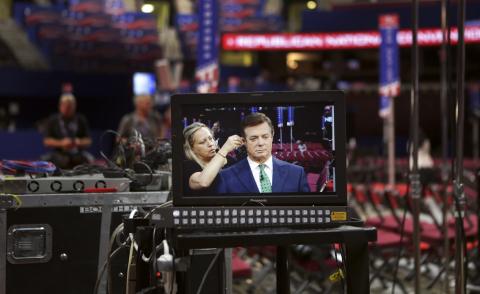The possible outcomes of the Russia investigation have always been wildly divergent. On one end of the spectrum, it is possible that the Russian government penetrated deep inside the Trump campaign—perhaps with the candidate’s knowledge—and the two entities knowingly colluded in a clearly illegal and perhaps treasonous manner, which could lead to a delegitimization of the 2016 Presidential election in the minds of many Americans, as well as President Trump’s impeachment. On the other side of this continuum, it is possible that Vladimir Putin’s attack was essentially limited to the hacking and dumping of e-mails from the D.N.C. and John Podesta, that Russia never had any illegal assistance from Trump or his associates, and that the entire Russia-conspiracy-theory industry will look enormously foolish in the years ahead.
There are lots of possible outcomes in between these two extremes. The apparent breadth and scrupulousness of the special counsel Robert Mueller’s investigation may ensnare officials for wrongdoing unrelated to Russian interference. Michael Flynn, for instance, might be indicted for work he did as an unregistered foreign agent for the government of Turkey, or for his failure to document payments from Russian entities on government financial-disclosure forms. Similarly, Paul Manafort, the Trump associate who seems to be in the most legal danger, may be in trouble for work he did before he joined the Trump campaign.
Even Trump himself, according to some reporting, may have more to fear from Mueller probing the legality of the Trump Organization’s financial dealings than his campaign’s possible interactions with Russia. And, then again, even these tantalizing legal outgrowths of the Russia investigation may not amount to criminal charges. Because of the thoroughness of the F.B.I. investigation into Hillary Clinton’s e-mail-security issues, some commentators, especially on the right, believed that Clinton was going to be indicted right up until the moment the case was closed.
But this week was a good one for Trump-Russia-conspiracy theorists. TheTimes reported major developments about the seriousness with which Mueller is pursuing a potential obstruction-of-justice case against the President. And the possibility that Russian entities had help in targeting voters using Facebook ads became a major part of the congressional investigation. But it was news about Manafort this week that gave a boost to two theories that close watchers of the Russia investigation have been hyping as potentially earth-shattering.
You don’t have to be Louise Mensch, the much-mocked amateur sleuth and Russia-conspiracy theorist, to wonder why, after years of working closely with a Russian oligarch and pro-Russia parties in Ukraine, Paul Manafort suddenly reëmerged in American politics as the head of the Presidential campaign that Vladimir Putin wanted to win. One theory, which has been floating around for months, is that after Manafort fell out with Oleg Deripaska, the Russian oligarch who accused Manafort of essentially stealing millions of dollars from him, he seized on Trump’s rise as a way of currying favor with Deripaska and Putin, who is Deripaska’s close ally.
This always seemed a bit too John le Carré to believe, but, on Wednesday, the Washington Post reported the first morsels that give the theory some credence. “Less than two weeks before Donald Trump accepted the Republican presidential nomination, his campaign chairman offered to provide briefings on the race to a Russian billionaire closely aligned with the Kremlin,” the Post said. In another e-mail, according to the Post, Manafort seemed to suggest that he could leverage his new role running Trump’s campaign to settle old debts. “How do we use to get whole?” Manafort wrote to an employee based in Kiev, referring to his prominent new role in Trump’s campaign. The link between Manafort’s sketchy work in Ukraine and Russia, and his interest in running Trump’s campaign, became a lot stronger after the Post piece.
The second Russia theory that was bolstered this week also involves Manafort, whose home in Virginia was raided by the F.B.I. in July and who was reportedly told by Mueller’s team that he is likely to be indicted. CNN reported this week that Manafort was the subject of a fisa warrant that gave the F.B.I. permission to spy on his electronic communications at some point last year and into this year. The report offers some of the most tantalizing evidence of the white whale of Russia investigators: outright collusion between the Trump campaign and the Russian government. “Some of the intelligence collected includes communications that sparked concerns among investigators that Manafort had encouraged the Russians to help with the campaign, according to three sources familiar with the investigation,” CNN noted. “Two of these sources, however, cautioned that the evidence is not conclusive.” The CNN report added that the “FBI interest deepened last fall because of intercepted communications between Manafort and suspected Russian operatives, and among the Russians themselves.”
We know that the Russians launched a cyber campaign to help Trump win. We know that the Trump campaign was willing to entertain assistance from the Russian government because Manafort, Jared Kushner, and Donald Trump, Jr., eagerly met with a Russian offering such assistance. This latest news suggests—though the reporting is still vague—what many people have long wondered: that Manafort may have been a crucial link between the Trump campaign and Russians seeking to defeat Hillary Clinton. If Mueller or congressional investigators unearth proof that Manafort colluded with the Russians, it will fortify the narrative that the Trump campaign worked with a foreign nation to alter the outcome of an American Presidential election—an unprecedented event in the country’s history. Trump could dismiss the evidence, deny knowledge of the collusion, and dismiss the Mueller investigation as a “witch hunt.” But this week’s disclosures moved the theorizing about Trump and Russia one step closer to becoming a politically devastating blow to Trump’s Presidency.
Ryan Lizza is the Washington correspondent for The New Yorker, and also an on-air contributor for CNN.


Spread the word